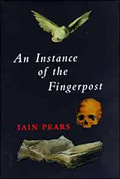"When in a Search of any Nature the Understanding stands suspended," wrote Francis Bacon, "then Instances of the Fingerpost shew the true and inviolable Way in which the Question is to be decided." It's a clue that of the four successive narrators of the long, devilishly intricate An Instance of the Fingerpost, one may be less unreliable than the others.
A Venetian traveler, seemingly brimming with openness and wide-eyed enthusiasm for scientific research, opens the narrative and introduces readers to Oxford in 1663. It's a cut-throat academic world: scientists compete for discoveries; canons compete for office. Three years since Charles II was restored to the throne, many are eager to forget two decades of chaotic warfare between Crown and Parliament; others are obsessed with remembering, seeking to impose order on the past by exposing the guilty and/or vindicating the condemned.
Amid a cast of gentlemen high in self-regard, a servant woman shines at the story's center. When the narrators condemn her for not submitting to their authority, their bias becomes evident. Their unreliability on other matters leads readers on a wild (if not speedy) ride of surprise revelations, as each narrator adds new layers of detail and meaning to the previous narrator's tale (readers with excellent memories will best be able to keep everything straight).
Sarah Blundy introduces us to the class which hoped Cromwell's revolution would establish equality for all people, "making the earth a common treasury for all." Those with the power to destroy and raise up governments could not tolerate such hopes: "If anyone can achieve power, then all will try, and government becomes a mere battle in which principle is sacrificed for interest. The lowest will impose themselves, for the best will shun the gutter." Despite strongly held religious differences, the Catholic Venetian and the Protestant English gentlemen share a belief in the divide between "lowest" and "highest." Sarah, one of those "lowest," serves as the fingerpost to a less orthodox, more Christlike religious perspective. (1998, 691 pages including a "Dramatis Personae" with information about the major historical and fictional characters)




